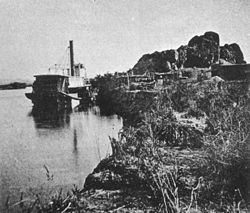Castle Dome Landing, Arizona
| Castle Dome Landing, Arizona | |
|---|---|
| Ghost town | |

Castle Dome Landing, 1877
|
|
| Location in the state of Arizona | |
| Coordinates: 32°57′54″N 114°27′49″W / 32.96500°N 114.46361°WCoordinates: 32°57′54″N 114°27′49″W / 32.96500°N 114.46361°W | |
| Country | United States |
| State | Arizona |
| County | Yuma |
| Founded | 1869 |
| Abandoned | 1978 |
| Named for | Castle Dome Mountains |
| Elevation | 203 ft (62 m) |
| Population (2009) | |
| • Total | 0 |
| Time zone | MST (no DST) (UTC-7) |
| - Opened | December 17, 1875 |
| - Closed | December 4, 1876 |
| - Opened | August 6, 1878 |
| - Closed | June 16, 1884 |
Castle Dome Landing, Arizona (also Castle Dome City) is a ghost town in the Castle Dome Mountains of Yuma County in the U.S. state of Arizona. It was first settled as a transport depot and mining camp around 1863 in what was then the Arizona Territory.
When the first Americans reached the Castle Dome Mountains in the early 1860s, there were already signs of previous mining activity. It was generally held that Native Americans had engaged in mining in the Castle Dome Mountains some years before and backpacked the ore 18 miles (29 km) south to a processing site on the banks of the Gila River, where remnants of adobe furnaces were found.
As mineral deposits began to be discovered up and down the Colorado River in the early 1860s, numerous mining camps and steamboat ports grew into towns along the river. Heading north from Yuma, prospectors staked gold and silver claims along the river and in the surrounding mountains. The Castle Dome Mining Company, established in 1863 and owned by Conner and Jacob Snively, purchased many of these claims and planned out the site of Castle Dome Landing on the banks of the Colorado River to act as a shipping point for ore on its way to California for smelting. The Snively's planned only to mine silver in the area, but in that same year, well-known geologist and mining engineer William P. Blake realized that the region's copper-lead ores held extensive value, and lined up investors to develop mining operations in the area.
Though prospecting and planning commenced years earlier, modern mining in the area didn't begin in earnest until 1869 due to hostilities with Native Americans. When the mines finally did begin operations, the mining camp that sprung up was known as Pitoti after a weed thought to be found only in that area. As the area grew, the town was renamed Castle Dome, and a post office was established in that name on December 17, 1875. Less than a year later, however, the post office was discontinued on December 4, 1876.
While the mining camp itself went into decline, the nearby riverside landing established some years earlier for steamboats of the Colorado River began to thrive. The landing, setup for transport of ore and as a supply point for the mines some 17 miles (27 km) east of the river, provided a new town site for the region, and was soon established as Castle Dome Landing. The post office re-opened under this new name on August 6, 1878, and the small port became an active supply and shipping depot for the mines in the Castle Dome Mountain mining district. For the next six years, Castle Dome Landing served as the first stop for steamboats traveling up the Colorado River from Yuma, and the town thrived, both as a supply and shipping point and as a popular destination for travelers from Yuma who came up the Colorado River for various celebrations held at the numerous river towns. For Castle Dome Landing, Mexican Independence Day on September 16 was the main draw.
...
Wikipedia


